The area no longer stinks. How I removed the unpleasant smell from a country toilet in half an hour
Content:
Owners of country houses will understand my pain perfectly. How to remove the unpleasant smell from a country toilet?!
It’s impossible to live: you go into a “house for solitary reflection” and your eyes water. The aroma is such that it knocks you off your feet. I have been looking for an effective method for years. I tried several methods - in some ways they worked, in others they didn’t. And finally found the perfect one.
Today I will tell you about the results of my “research”. Read, adopt, use.
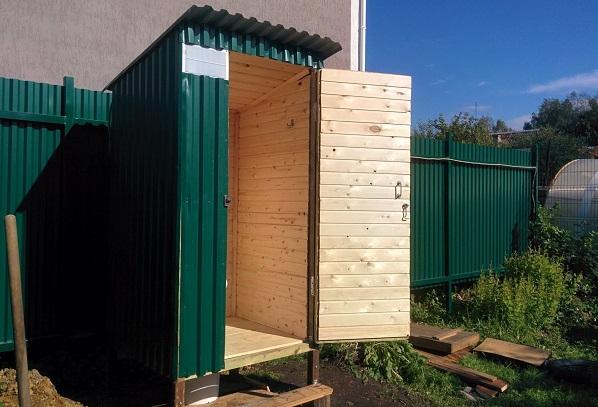
Good ventilation
I used to have a glass window in my toilet. And I thought that this was enough for ventilation. And what? It’s like that for everyone!
But then I started studying the issue and realized: windows, especially glazed ones, are nonsense. How will air pass through the glass? That's right, no way.
I widened the window above the door along the entire length of the wall and removed the glass. And to keep the flies from flying, I filled it with a net. And immediately it became easier to breathe!
At the bottom I made side ventilation. I cut holes in the walls at a level of 30 cm from the floor and also covered them with mesh. Why so low? So that there is a difference in height. Windows under the ceiling and above the floor create a draft that perfectly draws out odors.
The last step was exhaust ventilation. I ran the exhaust pipe straight to the cesspool.For what? To draw out odors! The main source of "aroma" is at the bottom. If most of the odor is removed through the exhaust pipe, the air in the toilet will be cleaner.
What to do
I used a 100mm plastic pipe.
- I cut a hole in the pit flooring according to the diameter of the pipe.
- I sawed a store-bought long piece into three pieces to make two elbows.
- I inserted a short piece of pipe into the hole to a depth of 0.5 m, connected the angle at 90O.
- I secured this entire structure with clamps.
- I took the pipe outside and made another elbow.
- I connected a long piece of pipe so that it rose above the roof by about 0.5 m. It would have been nice to go even higher, but I didn’t have enough pipe.
- I put up an umbrella to keep the leaves from flying in.
The result is that there is almost no smell in the toilet.
The main disadvantage of the method
You don't remove the smell. You simply take him out of the toilet and into the street. More precisely, into the yard. You open the windows in the evening, and instead of fresh air - it. Same thing.
And I wanted there to be no smell at all. Therefore, the search continued.
Traditional methods
On the advice of a neighbor, I tried this method. Everything is simple here. After each visit to the toilet, you need to sprinkle the surface of the cesspool with something biodegradable and hygroscopic.
Suitable:
- grass – freshly cut or dry;
- sawdust;
- ash;
- peat;
- fallen leaves.
The logic here is obvious. A layer of organic matter blocks the access of air to the contents of the pit. The foul fumes remain below and the smell from outside is minimal.
At the same time, sawdust and grass, when exposed to an aggressive environment, quickly rot and do not create excess volume. This is in theory. In practice, things are a little different.
The neighbor especially recommended tomato tops and nettles. Allegedly, these plants repel dung flies, kill bacteria and cleanse karma.
I'll be honest: I didn't notice any difference. Maybe my tomatoes are different or the nettle is special, but the toilet smelled exactly the same as after regular wheatgrass. And the flies were still there.
But the sawdust worked well: its volume was small, and the surface of the cesspool was covered with a continuous layer.
Ash was even better - but can you take that much of it? I had some left over from the fall and cold spring, but it was too little.
Disadvantages of the method
The neighbor assured that the tops would quickly rot and would not provide any volume. It is not true!
All this hay rots for a long time and tediously, the pit fills up several times faster. Yes, there is less smell. But I called the vacuum cleaners three times more often.
I heard from people that some people use the rotted contents of a cesspool as fertilizer. I don't even know what to say.
Under no circumstances should you fertilize the soil with human excrement. And pork, by the way, too. This is a breeding ground for bacteria and helminths that “crawl” onto the crop.
If you want to fertilize your garden, use cow, horse manure or plant humus.
Another disadvantage is that it is inconvenient. Every time after visiting the toilet you need to take a spatula and sprinkle. This annoyed the adults, but the children forgot. But here it is: I missed it a couple of times - and that’s it, again an unpleasant smell reigned in the toilet.
Dietary supplements
I found this method on the Internet. According to the description, everything was wonderful: you buy a miracle drug, pour it into a hole and the smell disappears.
The products that manufacturers offer are truly organic. These are bacteria adapted to live in human feces. Once in a cesspool, they begin to multiply and process the contents into humus and liquid, which has almost no odor.
Organic products are divided into three types:
- Aerobic bacteria.
That is, bacteria that need air to survive. Only suitable for open pit toilets. You pour (or pour) the product into the hole, create the conditions specified by the manufacturer, and after a while the smell disappears and the volume of sewage decreases.
- Anaerobic bacteria.
These microorganisms do not need air. The product is designed for closed cesspools. There is very little oxygen in such containers, but anaerobic bacteria don’t care.
- Bioactivators.
These are special enzymes that quickly process feces.
I’ll say right away: I have an open pit, so I didn’t check anaerobic agents. I can't say anything about this product.
And he sprinkled in products with aerobic bacteria. Great stuff. They really breed - and really decompose the contents of the cesspool. The smell of ammonia and hydrogen sulfide has disappeared almost completely. The toilet smelled of dampness and swamp. It’s also not violets, but I was satisfied with the result.
I also tried bioactivators. They work worse than bacteria, and their effect is not permanent. But there is a result: the smell is less, the volume of feces in the pit has decreased significantly.
And now about the cons
A lot of them.
Bacteria are living things. And quite fragile. They need a certain temperature, humidity level, and chemical composition of the environment.
My main problem was the humidity. The instructions for the drug stated that a bucket of water should be poured into the hole every 2-3. It’s not difficult for me - I’m often at the dacha. And people who come only for the weekend will find it inconvenient.
The chemical composition was easy to figure out. Previously, the wife poured water into the pit after washing the dishes and the floor - with detergents and alkali.After we “added” miracle bacteria to the toilet, my wife began to throw out such slop outside the garden, in a vacant lot. Yes, it's not difficult. But this is an extra burden.
Well, the temperature. Freezing kills bacteria. There's nothing you can do about it. This remedy only works in warm weather.
Chemicals
This is my favorite. Yes, it's not environmentally friendly. But quickly, efficiently and without hassle.
Such drugs are called: cesspool care products, septic tank cleaners.
The composition includes formaldehyde, bleach, nitrates and other aggressive chemicals. They react with feces, transforming them into a cloudy, thick “mud” without a characteristic odor. At the same time, they kill all bacteria and repel insects. There are no flies in my toilet.
Using such tools is very simple. You just need to pour the drug into the pit, sometimes add water to activate the reaction.
The disadvantages are obvious
The waste in the cesspool becomes toxic. My toilet is located far from the garden, so I am sure that the crop will not absorb anything harmful from the soil. There is a vacant lot behind the site, which means there is no need to worry about neighbors.
If the toilet was in a different place, I would use bacterial products. It's more difficult, but safer.
My personal invention
The filling level of a cesspool is perfectly reduced by... trees. My pit is lined with bricks with gaps along the top of the masonry. The moisture partially goes into the ground, and the drainage is located at such a level that it does not enter deep groundwater.
I planted an ornamental willow and red maple next to the toilet. When the trees grew and developed a full-fledged root system, they began to draw moisture. Now waste leaves the pit several times faster. The smell, of course, also decreased.
I was advised to plant a walnut near the toilet, but I didn’t take the risk. You never know what will be pulled out of the pit into fruit. I chose moisture-loving ornamental trees. They create a beautiful view, camouflage the toilet, and create shade.
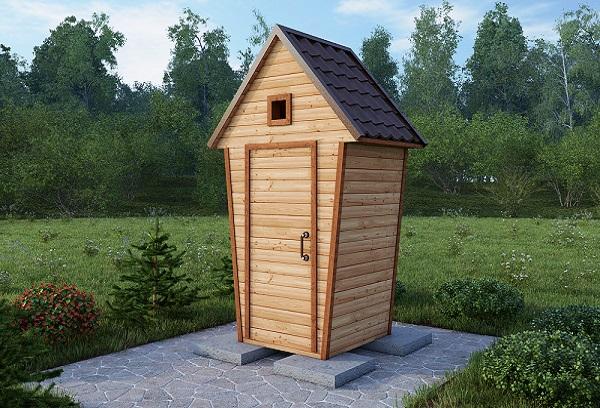
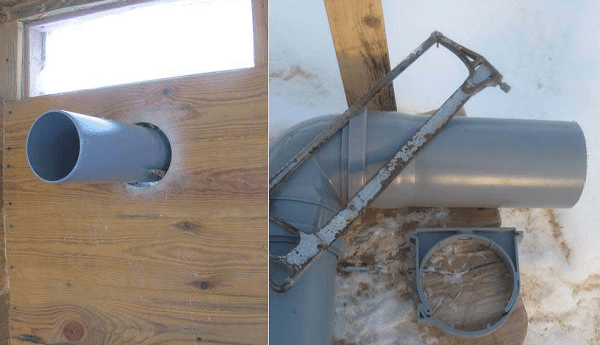
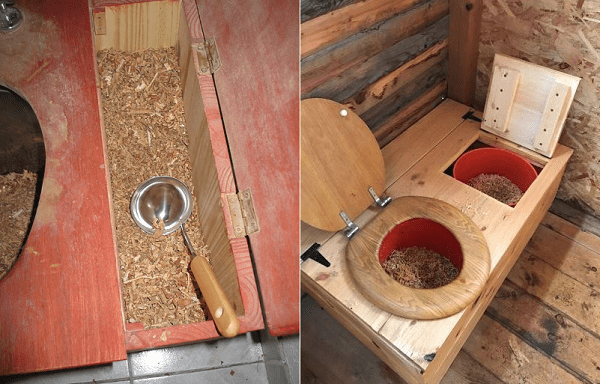
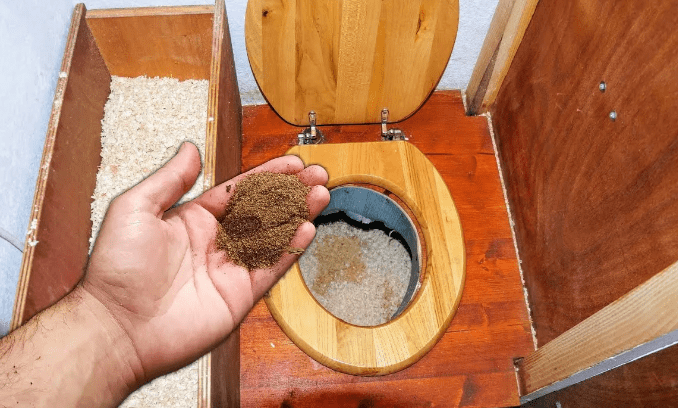
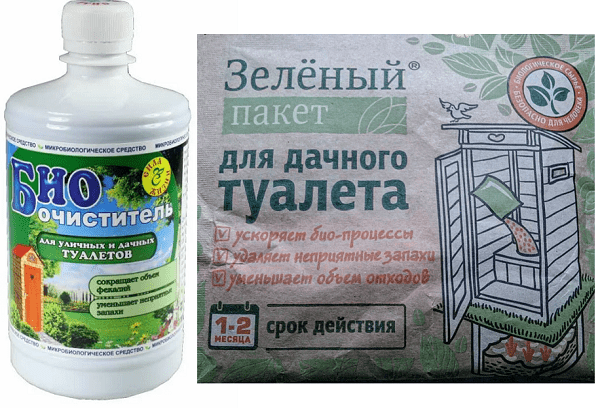
Don't bother with the cesspool. Place the bucket and then dump it into the compost. And there is no need to call anyone to clean it.